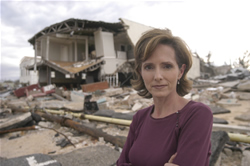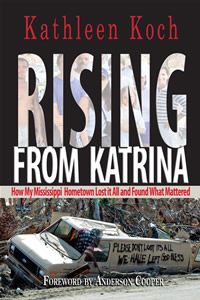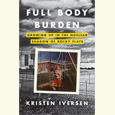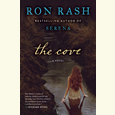The Neglected Survivors
Kathleen Koch writes a hopeful account of Hurricane Katrina’s impact on the Mississippi coast
A renegade barge crashing through the flooded Lower 9th Ward, chaos at the Superdome, the police shooting on the Danziger Bridge—all our enduring images of the havoc wrought by Hurricane Katrina, it seems, are set in New Orleans. That’s no surprise, since the news media focused almost exclusively on the city in the wake of the 2005 storm. But, as Kathleen Koch points out in Rising From Katrina: How My Mississippi Hometown Lost It All and Found What Mattered, the full fury of the hurricane actually hit along the Mississippi Gulf coast, and the devastation in towns like Waveland, Bay St. Louis, and Pass Christian rivaled or surpassed that suffered by New Orleans. Koch, a girlhood resident of Bay St. Louis who covered Katrina as a reporter for CNN, sets out to tell what she sees as a neglected story, recounting the terrible toll the hurricane took in Mississippi, and the residents’ heroic efforts to rebuild. She also reflects on her own feelings of loss and helplessness as she tried to get the rest of the country to notice the plight of her friends and former neighbors.
Koch moved with her family to Bay St. Louis in 1972, and she opens her book with a fond reminiscence of the town as it was then. She recalls an idyllic community, marred only by the scars left in 1969 by Hurricane Camille—a supposedly once-in-a-lifetime storm that demolished many of the city’s historic homes. The town’s collective memory of Camille had a critical impact on the reaction of its citizens as Katrina bore down on the Gulf coast. Although many people evacuated, a perverse survivor’s logic impelled many others to stay. “For Mississippians,” writes Koch, “Camille was the mother of all hurricanes, the benchmark against which they gauged all other storms. So if they’d ridden out Camille in a home or building, in their minds it was hurricane-proof, just as they themselves were hurricane-proof.”
 Their confidence was unfounded. Koch gives a harrowing description, based on first-hand accounts, of what it was like to ride out Katrina. The most horrific memories come from a young couple, Nikki and Patrick Cleveland, who took refuge in her parents’ home, a “fortress” that sat above the Camille surge line and was built with fourteen-inch-thick cement walls reinforced with steel rebar. The family was certain it was indestructible, but Katrina’s massive storm surge demolished it within an hour. The two couples “grabbed hold of what structure was left as the walls collapsed and the sheetrock began tearing off the studs. Wave after wave slammed into them, knocking them off their feet.” All of them were ultimately washed out of the remains of the house. Nikki and Patrick survived hours in the water, battered by floating debris. Both of Nikki’s parents died.
Their confidence was unfounded. Koch gives a harrowing description, based on first-hand accounts, of what it was like to ride out Katrina. The most horrific memories come from a young couple, Nikki and Patrick Cleveland, who took refuge in her parents’ home, a “fortress” that sat above the Camille surge line and was built with fourteen-inch-thick cement walls reinforced with steel rebar. The family was certain it was indestructible, but Katrina’s massive storm surge demolished it within an hour. The two couples “grabbed hold of what structure was left as the walls collapsed and the sheetrock began tearing off the studs. Wave after wave slammed into them, knocking them off their feet.” All of them were ultimately washed out of the remains of the house. Nikki and Patrick survived hours in the water, battered by floating debris. Both of Nikki’s parents died.
It’s a tribute to Koch’s gifts as a writer that her tale of the storm is so riveting, even after five years of similar Katrina stories, and the same is true of her account of the post-apocalyptic environment on the Mississippi coast in the weeks and months after the hurricane. CNN sent her to cover her old home turf, and there’s a terrific immediacy to her recollections of driving around the ruined towns of Bay St. Louis and Waveland with her colleagues in a well-stocked SUV, trying to balance her duties as a reporter with her feelings of grief and her desire to help. Her stories of encountering desperate survivors—including a dazed, shotgun-wielding man who demands their spare gas—give a real sense of the shock and disorientation people experienced. She makes it easy to understand why, even after she returned to work in Washington, D.C., she found herself unable to shake the measure of trauma she shared with the victims: “I looked up at my image in the mirror. It was me but different. Then I recognized that weary, distant look. I had the Katrina face.”
 About halfway through the book, Koch turns her attention to the recovery and rebuilding of the Mississippi coastal communities, and here her narrative begins to falter. It’s hard for any writer to make tangling with insurance companies and government bureaucracies as exciting as life-and-death struggle during a monster hurricane. Koch gives it her best shot, however, especially in her portrayal of the insurance companies as the real villains of the recovery. Readers will share her outrage at the fact that many insurers succeeded in denying legitimate claims by exploiting loopholes in homeowners’ policies. The Clevelands were among those who were forced to do battle with their insurer long after Katrina, while Patrick struggled with cancer. They eventually settled for far less than they were owed.
About halfway through the book, Koch turns her attention to the recovery and rebuilding of the Mississippi coastal communities, and here her narrative begins to falter. It’s hard for any writer to make tangling with insurance companies and government bureaucracies as exciting as life-and-death struggle during a monster hurricane. Koch gives it her best shot, however, especially in her portrayal of the insurance companies as the real villains of the recovery. Readers will share her outrage at the fact that many insurers succeeded in denying legitimate claims by exploiting loopholes in homeowners’ policies. The Clevelands were among those who were forced to do battle with their insurer long after Katrina, while Patrick struggled with cancer. They eventually settled for far less than they were owed.
Koch does a fair job of capturing the long-term exhaustion and stress of rebuilding, but Rising from Katrina goes off the rails when she takes to lauding her old hometown for its unshakable optimism and can-do spirit. The problem is not with her claims for the courage of the people of Bay St. Louis. The fact that they survived and are restoring their community provides ample evidence of that, and many of the individual stories she tells are truly inspiring.
The problem comes when she strays into boosterism, suggesting several times that there’s something uniquely virtuous about Mississippians. At one point, she just comes right out and says it: “Mississippi was not Louisiana. Residents were not going to scream from the rooftops for help. Mississippians were proud, hardworking people not accustomed to receiving charity.” Granted, this is the only really mean-spirited moment in an otherwise generous and upbeat effort, but that just makes it harder to overlook.
Regional chauvinism notwithstanding, Koch succeeds admirably in relaying the largely untold story of Bay St. Louis and the other battered towns on the Mississippi coast. The combination of her skills as a reporter and her personal attachment to the region serves the book well, making it possible for her to balance objectivity with insight and genuine sympathy. It’s the sort of history we would all want told of our community in a time of crisis—truthful, not sugar-coated, but ultimately hopeful, confident of the happy ending that has not quite arrived.
Kathleen Koch will discuss Rising from Katrina at Davis-Kidd Booksellers in Memphis on August 12 at 6 p.m.


